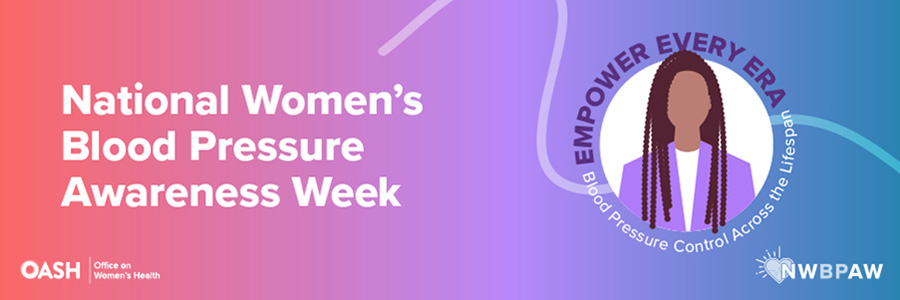
Discover the real-life stories of women who experienced high blood pressure and heart health concerns at different stages of life.
Video: Susan’s Story — High Blood Pressure During and After Pregnancy
In this video, Susan shares her experience with high blood pressure after during and pregnancy, what she learned throughout the process, and advice for women who are going through similar experiences.
Monique’s Story — High Blood Pressure During Menopause
Monique, a cancer survivor, began having high blood pressure during menopause. She has lived with heart disease for 20 years, including heart failure, and received a heart transplant. Read more about Monique’s journey below and hear advice she has for other women when managing their heart health.
Monique Acosta is no stranger to health challenges. Diagnosed at 22 with idiopathic cardiomyopathy, a heart condition with an unknown cause, she managed her condition for years before undergoing a lifesaving heart transplant in her 40s in 2017. Later, she faced another hardship with cancer, adding new layers to her health journey. But it was during menopause that she experienced high blood pressure for the first time—a change that made her realize how crucial it is to speak up and work closely with health care providers. Monique, now 52, lives in Northern Virginia and works in nonprofit development. She strongly believes in the power of self-advocacy, especially as women navigate health challenges that come with aging.
Five years after her transplant, in late 2022, Monique began experiencing stomach issues and found herself in and out of the hospital during the holidays. A biopsy revealed she had lymphoma, a type of cancer related to the immunosuppressant medications she had been taking since her transplant. Shortly after she completed chemotherapy, her blood pressure began to rise.
“It started with headaches, and then I saw my blood pressure was up at my clinic visits,” Monique recalls. Her doctors advised her to monitor it, but no one explained why it was happening. It wasn’t until Monique attended a seminar about menopause and high blood pressure that she finally connected the dots. Reflecting on the situation, Monique said, “The emotions were a little bit of surprise and frustration,” adding, “They tested me over the years, first saying I was premenopausal, then menopausal, and later postmenopausal, but no one explained how any of these stages could affect my blood pressure.”
Monique wasn’t alone in this discovery. She later learned that her cousin had experienced a similar rise in blood pressure during menopause, pointing to a possible family connection. Despite the lack of guidance from her health care providers, Monique took control of her health. She adjusted her lifestyle, focusing on a lower-sodium diet, staying hydrated, and checking her blood pressure daily.
“Treat your body like your best friend,” Monique advises. Just as she would encourage her friends to get checked if they had health concerns, she urges women to do the same for themselves. Monique also acknowledges the added difficulty Black women often face in health care settings. “It can be hard to get providers to listen to you, especially as a Black woman,” she explains. For women who feel dismissed or unsure of how to advocate for themselves, her message is clear: “It’s not a privilege[but]a right to have these conversations. If you don’t feel heard, go see another provider. Get a second opinion. Get a third opinion.” She also suggests bringing a trusted family member or friend to appointments for added support.
Monique’s story is a powerful reminder that self-advocacy is key to good health. As a national WomenHeart champion, she shares her journey to inspire other women to take control of their health. “I am responsible for my health—me, no one else,” she says, emphasizing that managing your health starts with you.
Take Action: Learn more about how menopause can affect blood pressure, and explore this resource on advocating for yourself in health care settings. Remember, regular checkups and speaking openly with your doctor about any changes are crucial to maintaining heart health.
Florence’s Story — Heart Disease Misdiagnosis
Florence went to the emergency room multiple times with symptoms including sweating, chest pain, and shooting pain in her arm, but doctors told her it was all in her head. After continued advocacy for herself to receive the care she needed, she was finally diagnosed with a blocked artery and had surgery. Read more about Florence’s journey below and hear advice she has for other women when managing their heart health.
Dr. Florence Champagne’s journey from experiencing high blood pressure to having open-heart surgery is a powerful reminder of the importance of self-advocacy and health care awareness, particularly for Black women. Her experience highlights the unique challenges that Black women face, both within the health care system and in managing their health amid life’s demands.
At 65, Dr. Champagne serves as the CEO of the Open My Heart Foundation, but her journey with high blood pressure began 13 years ago. “My feet were swollen, but I had so much to do that I didn’t think much of it,” she recalls. A nurse at the nursing home where she worked insisted on taking her blood pressure, revealing levels dangerously over 200/100 mm Hg. A normal blood pressure is under 120/80 mm Hg. Despite the urgent warning, Dr. Champagne dismissed the severity of her condition. “I felt that I was too busy for all of this,” she admits, reflecting a mindset that many women often adopt as they juggle numerous responsibilities.
This dismissal of her condition came at a cost. A year later, Dr. Champagne suffered a heart attack, which became the wake-up call she couldn’t ignore. “I dismissed my high blood pressure... and then it got progressively worse,” she says. Despite multiple ER visits for shortness of breath, her symptoms were often downplayed by health care providers. “They kept telling me I looked fine. They even recommended counseling, like the pain was all in my head,” she recalls, highlighting a common experience of Black women, whose symptoms are often not taken seriously.
It wasn’t until Dr. Champagne met a cardiologist who took her concerns seriously that she received the care she desperately needed. “For the first time, I felt like someone was being honest with me,” she says. The cardiologist discovered that her main artery was 99.9% blocked, necessitating immediate open-heart surgery. “He told me, ‘We have to perform emergency surgery, or we’re going to lose you.’ It’s a good thing I came when I did.” Now Dr. Champagne uses her experience to advocate for other women, particularly Black women, who face similar health care challenges. “You’ve got to save yourself before you can save someone else,” she stresses.
Her personal transformation has been just as profound as her journey with high blood pressure. Dr. Champagne has adopted a plant-based diet, exercises regularly, and closely monitors her health. “I’m under doctors’ care, and my blood pressure is down, which makes me really happy,” she shares. This change has also extended to her family, in whom she is determined to break the cycle of unhealthy habits. After losing both her brother and her nephew to heart-related issues, Dr. Champagne has become a vocal advocate within her own family. “We had a family vacation recently, and I couldn’t ignore what I saw. The amount of sugar and salt the kids were consuming was alarming. I had to stop everything and talk to them and their parents about the risks. It’s in our family, and it has to stop.”
Dr. Champagne’s story serves as a compelling reminder that self-care isn’t selfish; it’s essential. “Make sure you put the oxygen mask on yourself first,” she advises. Through her advocacy and her role as a national spokesperson for WomenHeart, Dr. Champagne continues to turn her pain into purpose, helping others navigate their own health journeys with the knowledge that they deserve to be heard and cared for.
Dr. Champagne urges all women, but especially Black women, to take charge of their health by seeking the knowledge and tools they need to protect themselves. Learn more about how you can empower yourself to take control of your health and well-being today.
Explore More Stories
To hear more from women with lived experience, explore the Yes, YOU! and Hear Her campaigns below.
Yes, YOU! campaign — NIH National Heart, Lung, and Blood Institute (NHLBI)
Hear Her campaign — Centers for Disease Control and Prevention (CDC)



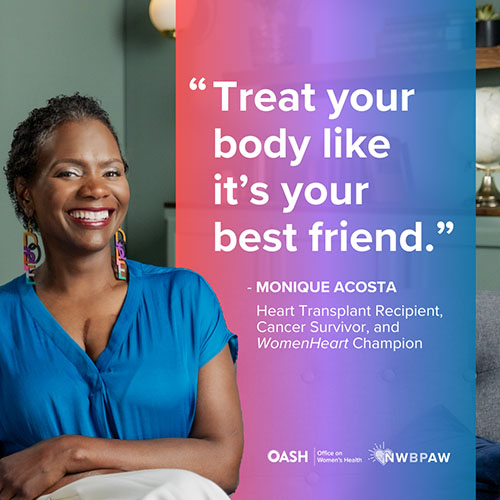 View larger image
View larger image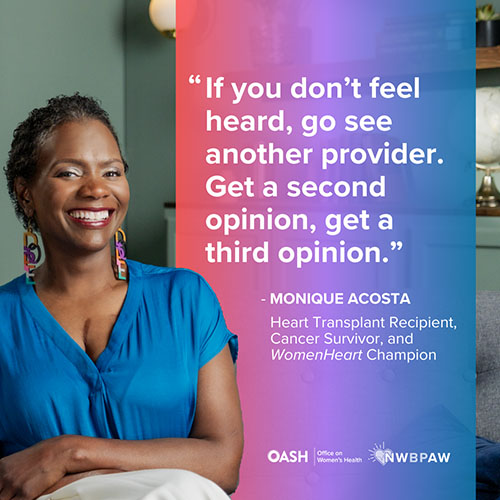 View larger image
View larger image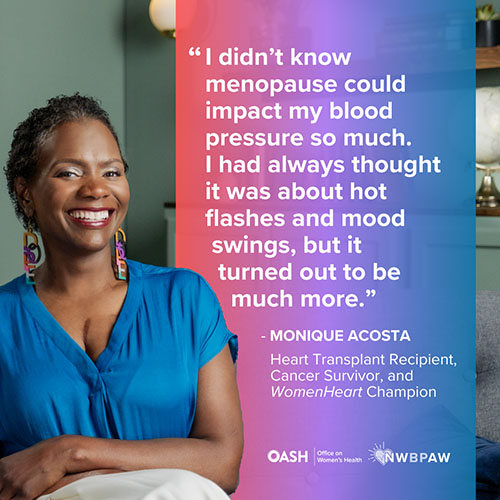 View larger image
View larger image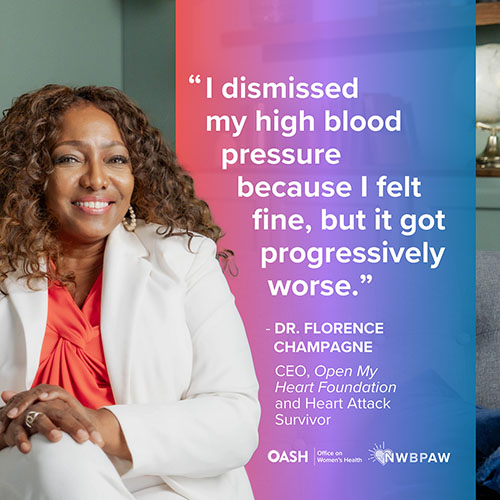 View larger image
View larger image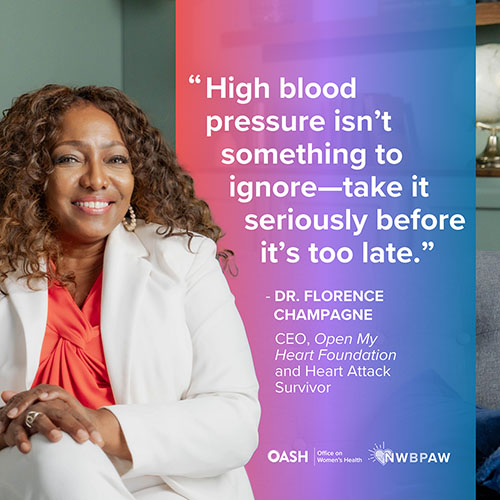 View larger image
View larger image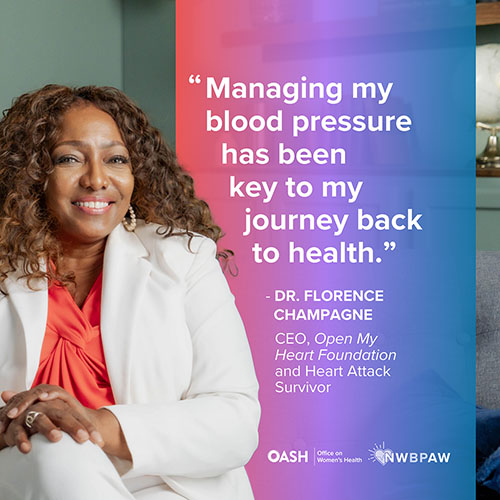 View larger image
View larger image